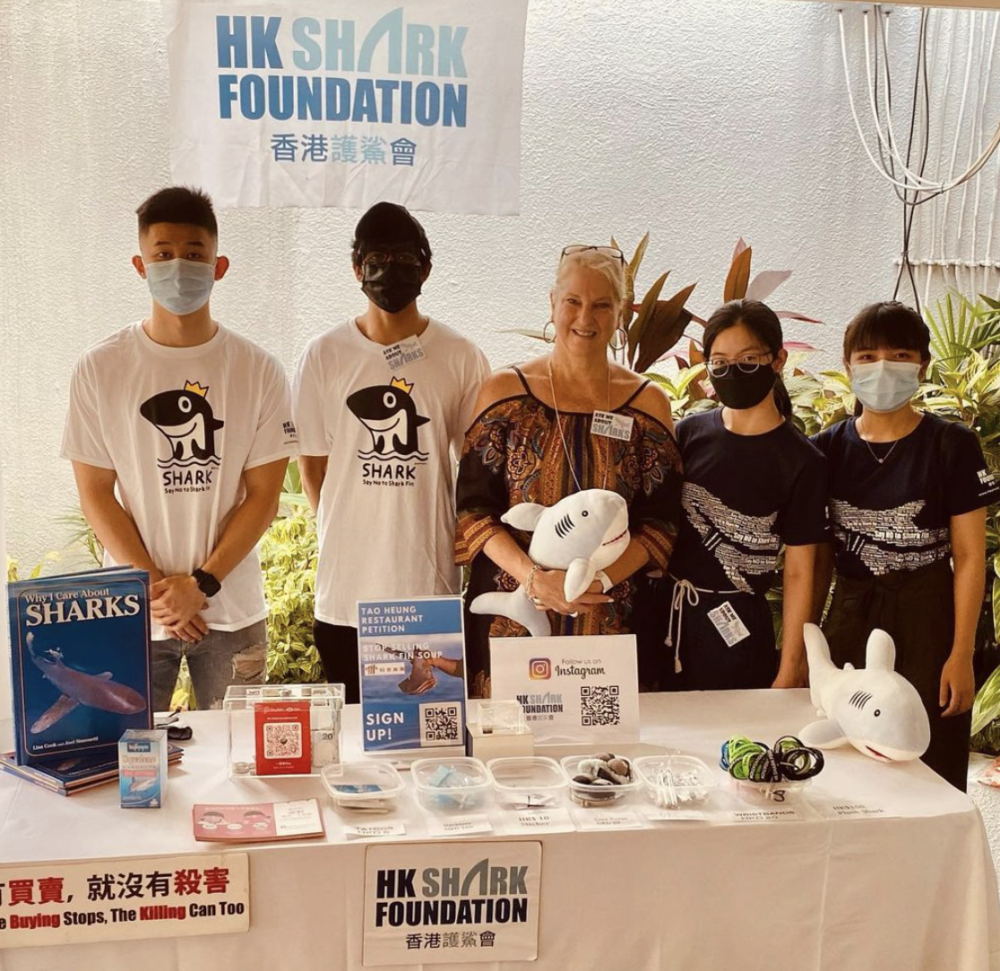
-Shriya Swaminathan
Andrea Richey, lovingly known as the Shark Lady has been using her superpowers to “Raise Awareness about Shark Conservation.” Those five words are at the core of the Hong Kong Shark Foundation’s efforts and we at VEGWORLD had the immense honor of chatting with the renowned Shark Lady herself. Andrea was a former lawyer who fortunately found her calling in ocean conservation. From there on, the majestic creatures of the seas have gained a fierce ally committed to their protection. In recognition of Shark Awareness Day, we bring you the story of her trailblazing organization, their tireless efforts, and creative campaigns to save the sharks; as an ocean without sharks becomes a planet devoid of life.
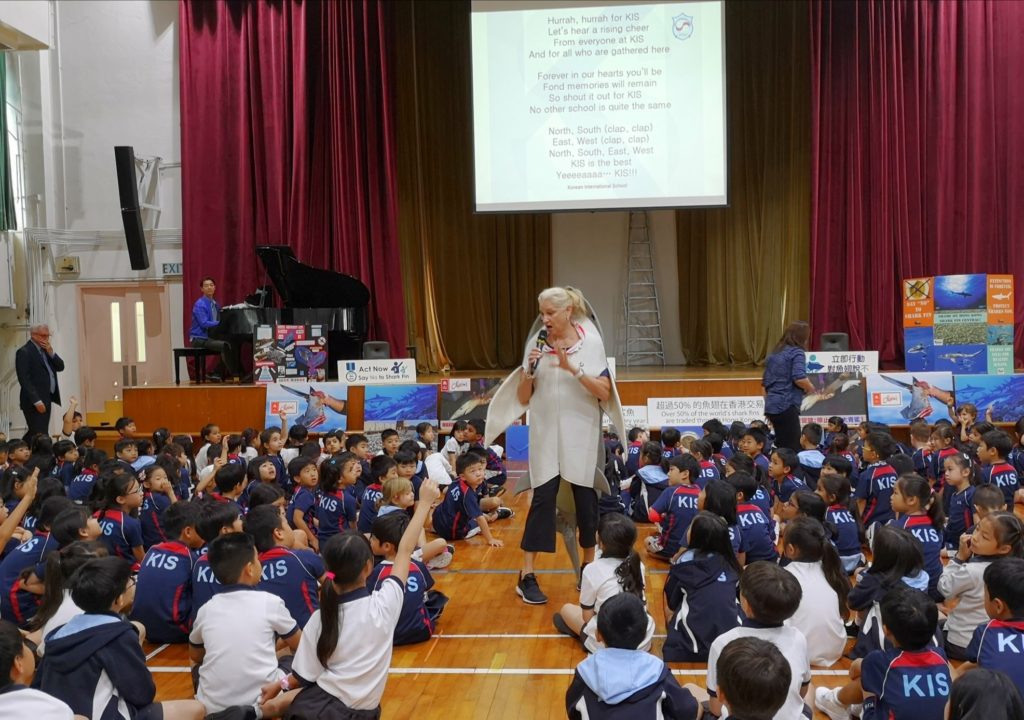
VW: Seaspiracy has been making quite the splash in creating awareness about Ocean Conservation and the horrors of the shark fin trade. What were the origins of shark fin consumption being equated to one’s high status and wealth?
AR: The exalted consumption of shark fin soup can be traced back to an emperor from the Song Dynasty. After hearing about its description in a poem, he was inspired to recreate the dish as a symbol of his power, status, and wealth. The prestige that is tied with serving shark fin soup has trickled down in today’s societies. It’s a luxury dish that guests expect at social gatherings such as weddings, as a sign of respect. However, we are working diligently to change that narrative and showcase shark fin soup for what it truly is- the brutal exploitation of a key species who are crucial for the healthy survival of all lifeforms on Earth.
VW: Why are sharks so critical for our survival on this planet?
AR: Sharks play a pivotal role in maintaining balance in the delicate marine ecosystem. For example, as a result of the overfishing of sharks on the US Atlantic coast, a century-long scallop fishery collapsed! Turns out, the sharks were predators of the cownose ray, who were in turn preyed on scallops. Dwindling shark populations meant an unchecked cownose ray population. Result- complete decimation of scallops! A healthy ocean ecosystem is vital for the survival of life on land as well. Our oceans help regulate the earth’s temperature and generate nearly 50% of the world’s oxygen. It isn’t worth the catastrophic domino effect that is bound to ensue if we interfere with nature’s ability to restore balance to our ecosystems.
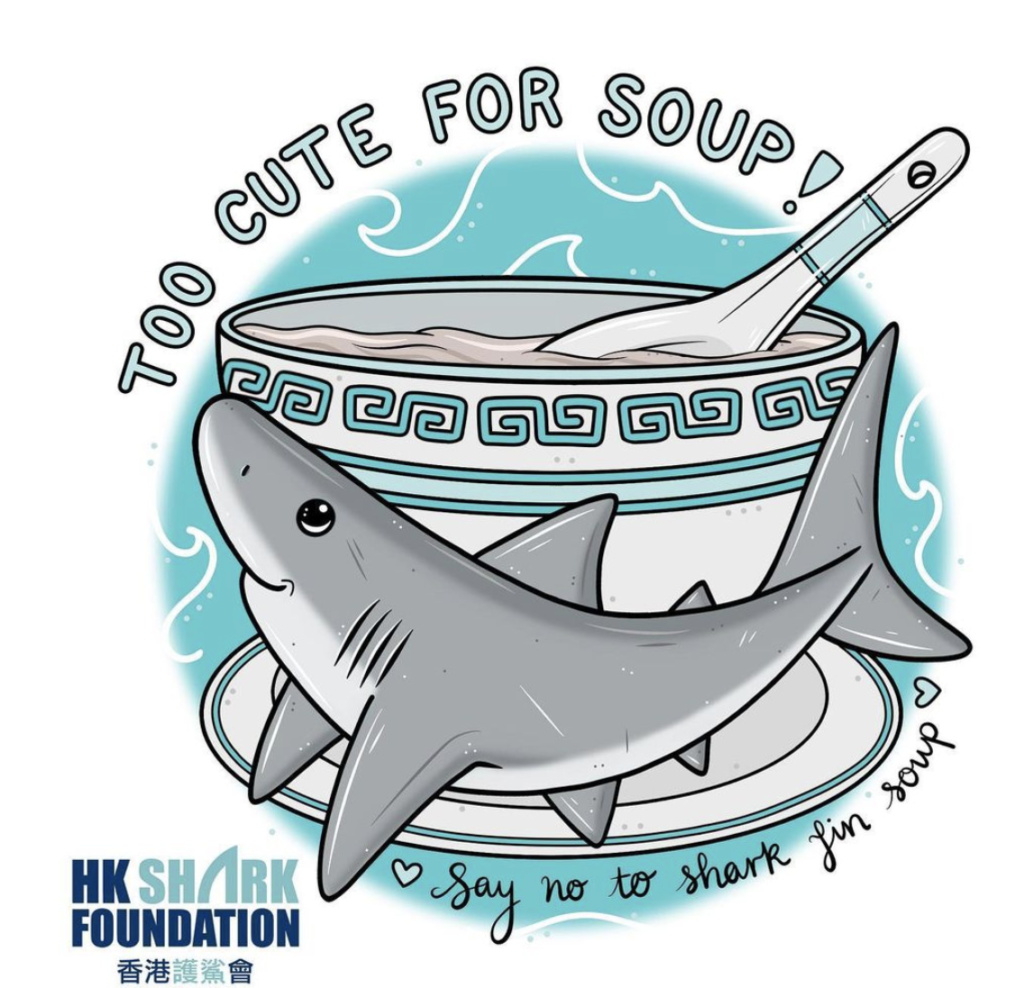
Despite their importance, several shark species are on the verge of extinction. There is very limited protection in the form of trade restrictions for such iconic sharks as the whale shark, the hammerhead shark, the sawfish, and the great white shark.
VW: What is the international status when it comes to laws and regulations in place to protect sharks from exploitation?
AR: When it comes to international policy, it gets quite messy. In some jurisdictions, finning at sea is banned. It is also disheartening that the United Nations Convention of Trade in Endangered Species (CITES) does not protect all shark species despite many being recognized as globally threatened. While a CITES recognition applies restrictions to trade between countries, it does not regulate a country’s domestic catch.

In Hong Kong, unless the shark fin is from 1 of the 12 species recognized by CITES as endangered, no regulation limits shark fin sales. But one cannot know the species unless a DNA test is conducted, so the ability to enforce such regulations is very poor.
There is an ongoing EU Citizens’ Initiative to stop the shark fin trade in the European Union. The UK and the United States have existing bans on shark fin imports. While they are efforts in the right direction, none of them affects the ability to import a whole shark.
We believe that too many sharks are being killed at alarmingly high rates that simply cannot be sustained. Whether they land in the port with or without their fins does not address the ethical or ecological arguments against exploiting sharks.
VW: What are the key drivers of the demand for the global shark trade?
AR: That’s an important question! We estimate an alarming 50% of the global shark fin trade lands in Hong Kong and that’s mostly related to food. Throughout the world, health and beauty industries fuel the increasing, unsustainable demand for squalene- an organic compound from shark liver oil, that is used in supplements, makeup, lipstick, and other products. Advancements in science negate the need for killing sharks for these products!
In Australia, they sell flake (shark meat) for their fish and chips instead of cod due to the collapse of the cod industry as a result of overfishing. Italy is the number one consumer of shark products in Europe and ranks second in the world owing to its leather, women’s makeup, and culinary industries! Sharks’ skins are used for shoes, belts, bags- you name the accessory and chances are, a shark was an involuntary participant.

The world’s leading shark consumer is Brazil, which to my understanding is the result of a large population (over 121 million people) that has easy, open access to the ocean and a culture that, like Hong Kong, has a long history of seafood in its diet. Sadly people struggling in Brazil to feed their families, have turned to consume cheap and readily available shark meat which has fueled the unsustainable demand for sharks even more. As you can see, there is some overlap in what drives the demand for shark products. It’s perpetuating the belief that sharks are property for us to use rather than beings who are here on Earth with us.
VW: How have you navigated the cultural barriers when it comes to advocating against shark fin soup? What strategies do you find most effective?
AR: To be honest, I have rarely encountered many cultural barriers. After speaking to people and educating them about how this practice of shark finning is cruel, unsustainable, and full of poisons, few people insist on playing the “cultural card”.
The most effective strategies have been planting the seeds of change, i.e., through our campaigns like our Shark Ambassador education program, speaking engagements at schools, hosting community educational events, and even beach cleanups. I find that including the community in your advocacy is an important piece for sustained change. Our mission is to raise awareness about shark conservation and empower people to make cognitive behavioral changes and stop consuming shark products.

VW: How about the large corporations and weddings who pledge not to serve shark fin soup? Is there a different strategy that you find beneficial in these cases?
AR: Our Shark-Free Company Campaign is a corporate campaign aimed at persuading companies to pledge not to promote or support the consumption of shark fin in any corporate context. In this campaign, we’ve found our strategy is effective when we encourage all companies to set a good example for their respective industries because we believe that, in today’s market, there is no need to serve shark fin to show respect or win favor.
For our Shark-Free Wedding Campaign, we work at providing support and encouragement for couples who wish not to serve shark fin at their weddings. By participating in our ‘Shark-Free Wedding’ campaign, we hope more couples will recognize how cruel and unsustainable serving shark fin soup at their wedding is while recognizing a valuable opportunity to protect sharks by educating their family and guests. It’s a neat way to actively promote shark conservation at their wedding!
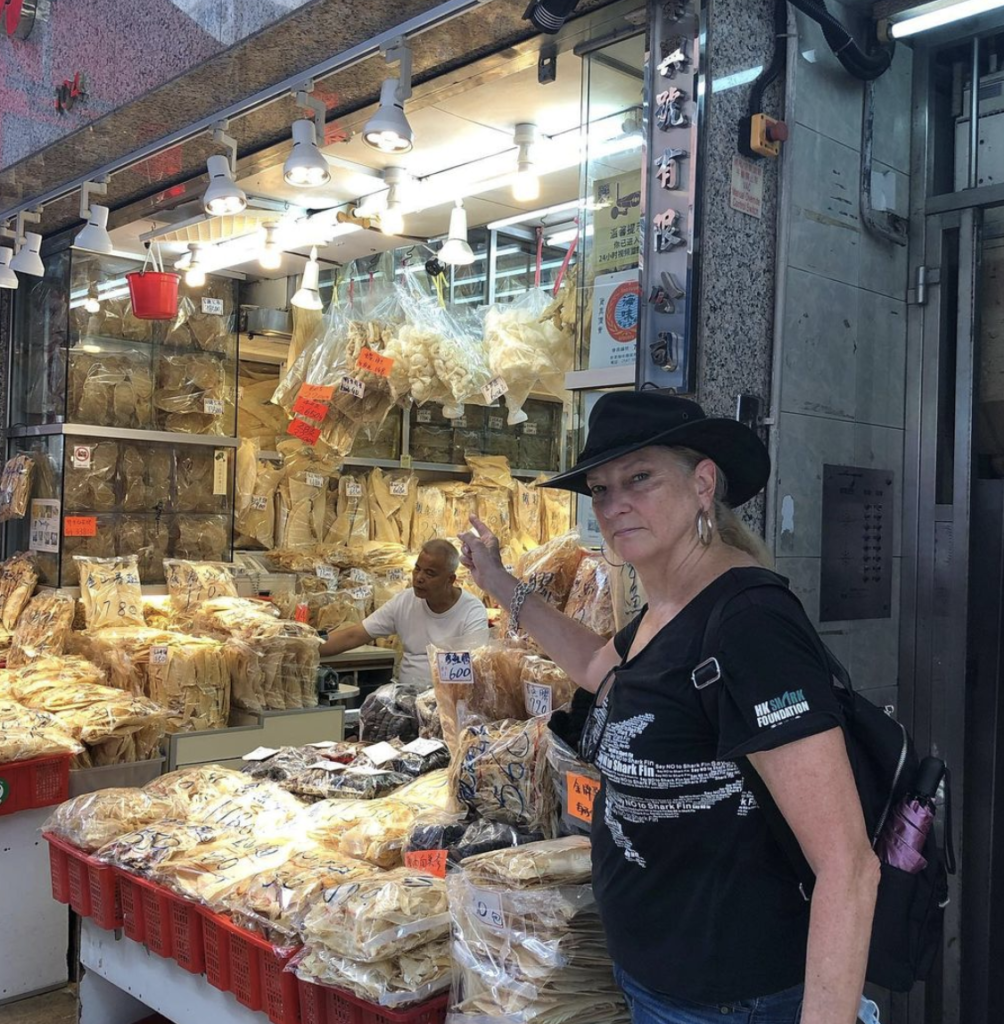
VW: Do you organize public activities at restaurants and marketplaces that sell shark fins?
AR: Before the pandemic, we would organize public activities dressed up in shark costumes outside restaurants that served shark fin soup. Out of the nearly 4000 seafood restaurants in Hong Kong, only 4 of them do not sell shark fin soup. We have a lot of work to do on that front. Recently, I started organizing educational walking tours for the local communities, showing them marketplaces in their neighborhoods that legally sell dried shark fins. Participants are appalled when they realize how close they’ve been living to these markets. It’s a valuable reminder that education and awareness are at the core of our activism.
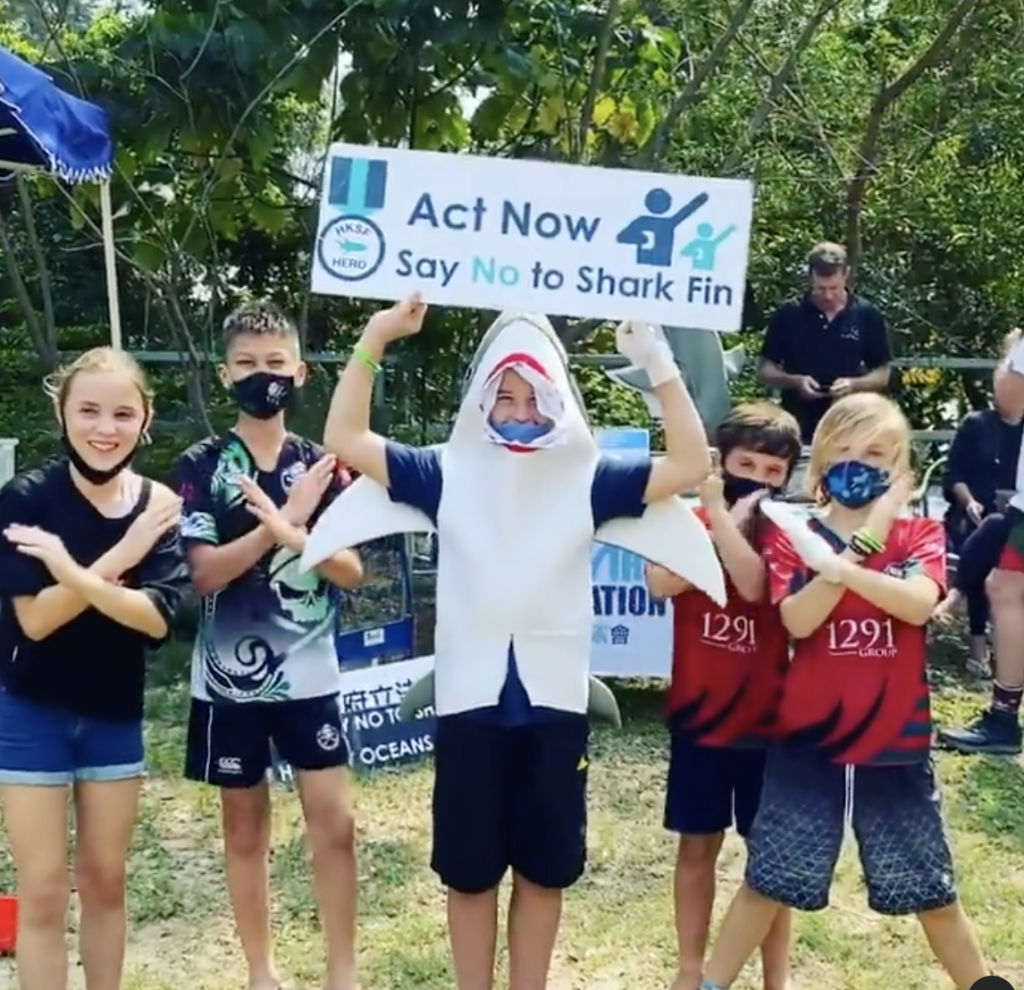
VW: From your years of experience in advocacy, which target audience is most receptive to your message?
AR: Hands down the young kids! They often bring their parents to the walking tours, encourage them to sign our petitions and pledges, organize fundraisers in their schools, and so much more! Most of our volunteers and interns are local kids and teenagers, who work hard with dedication and passion. It brings me hope when I see how engaged they are with the importance of doing good for the planet and all our fellow species. They show up unperturbed by the politics, the scope of the challenge, or the direness of the situation. What matters most is that they do not hold back in their advocacy efforts even with their families. It’s remarkable and inspiring!
VW: It’s so unfortunate that sharks are negatively affected by their portrayal in our daily media and entertainment. Do you have ideas on how we can switch that narrative?
AR: Media’s portrayal of sharks as predators after human flesh is simply flawed. Sharks are very opportunistic hunters! They go after the sick and weak instead of spending valuable energy chasing after a meal. Unprovoked shark attacks on humans are highly uncommon (like 6-8 deaths from shark attacks per year on average) and often accidental as they may mistake the silhouette to be that of their prey species. Here’s a fun statistic- In the United States, the risk of being struck down by lightning is 30 times more than that of being killed by a shark! Globally, more beachgoers are detrimentally impacted by dehydration, jellyfish stings, and sunburn or while driving to and from the sea than they are by shark attacks! On the contrary, our species kills sharks on the scale of 100’s of millions per year globally. Makes one question who the real harmful predators are doesn’t it?
VW: As the revered Shark Lady with a wealth of fun facts, we’d love to know what fascinated you the most about Sharks!
AR: That’s a hard one! I was pretty amazed when I learned that the only way to determine the species of a shark fin was through DNA testing. A fact that blew my mind was learning that the Greenland shark can live over 500 years! They inhabit the cold waters near Greenland. Even more astounding- the female Greenland shark does not become sexually mature until she is about 120 years old. Imagine humans having to wait till they are 120 to have a baby!
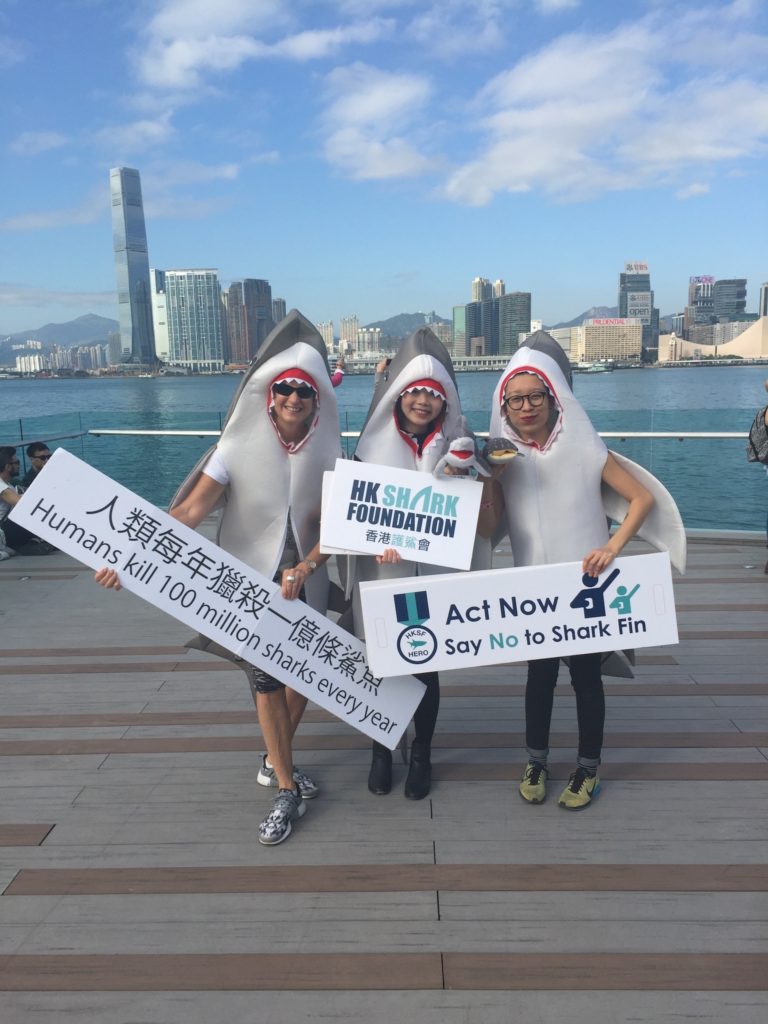
VW: The wonders of the ocean are truly endless! On that note, what can we expect from the Hong Kong Shark Foundation in the future and how can our community support your work?
AR: We hope to expand our efforts to raise awareness about sharks globally, get more volunteers and interns, collaborate with more NGOs, raise more funds, and save more sharks! Be it for food, sport, or tourism, there is no excuse for decimating the population of another species for trivial human pleasure. A global platform to educate and spread the message is key and we need all the support we can get to change the world for the better! We welcome donations, crowd-funding events to support our campaigns, invitations for educational presentations, and any outreach support to help us spread awareness about shark conservation!
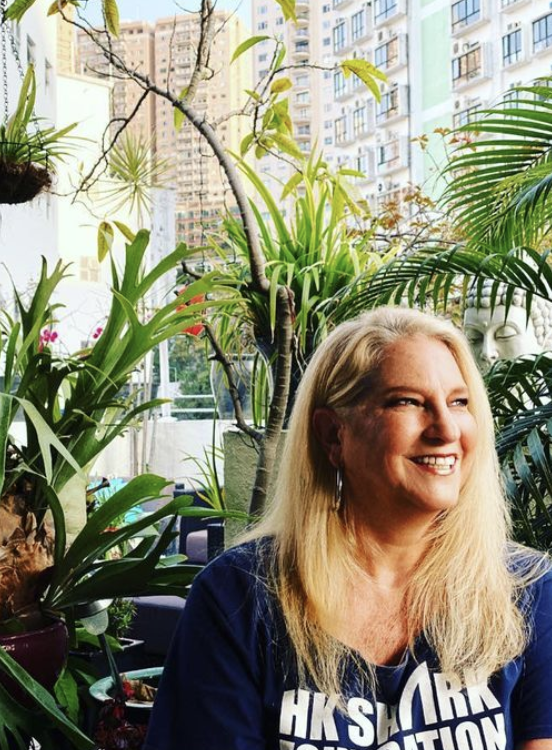
“We are all Farmers. We are planting the seeds of change in the world.”
-Andrea Richey (The Shark Lady)
Executive Director
Hong Kong Shark Foundation
Resources: HKSF Website, Instagram, Andrea’s TEDx Talk, Facebook


Andrea is doing amazing work! Her theme, “When the buying stops, the killing stops”, rings such truth.